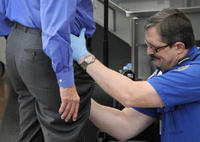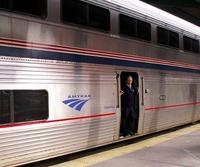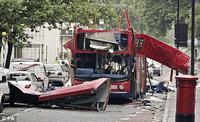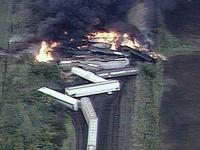-
Scientists continue to raise doubts about safety of full body scanners
The controversy over the Transportation Security Administration’s (TSA) body scanners lingers on as scientists continue to question the safety of these devices that expose millions of people to trace amounts of radiation; TSA officials maintain that their full body x-ray scanners are safe as they only expose individuals to negligible amounts of radiation, the equivalent of two minutes of flying; despite these assurances, a group of five scientists recently sent an open letter to the White House Science advisor; the scientists argue that the tests used to validate TSA’s claims contain critical flaws, lack transparency, and have not been independently verified
-
-
Texas House prohibits intrusive airport pat downs

The Texas House of Representatives approved a bill that would make invasive pat downs at airports a crime; pat down procedures that would be covered under the measure are inspections that touch the anus, sexual organ, buttocks, or breast of another person including through the clothing, or touches the other person in a manner that would be offensive to a reasonable person; the law would not be enforceable since state legislatures have no authority over federal agencies such as the TSA
-
-
How safe are U.S. railroads?
Following the revelation that al Qaeda had aspired to attack U.S. railways, security experts, the media, and lawmakers have turned their attention to improving security for American trains; in a recent interview with CNN, Brian Michael Jenkins, the director of the Mineta Transportation Institute’s (MTI) National Transportation Security Center of Excellence, discussed the current state of railway security, how realistic creating an airline style screening system for railroads would be, and what measures need to be taken to secure railroads; to realistically improve rail security in a cost effective manner, Jenkins urged passengers to begin taking a more active role; Jenkins also urged the United States “to be more realistic about risk”
-
-
Sector Report for Thursday, 12 May 2011: Transportation Security
This report contains the following stories.
-
-
EU proposes recording all data on airline passengers, including their meals
To help combat terrorism, the United Kingdom hopes to join a European Union information sharing database; under the proposed program, dubbed the Passenger Name Record directive, authorities will collect detailed information on airline passengers including their phone number and how they paid for their ticket as well as a credit card details and billing addresses; a passenger’s information will be stored up to five years and after the first thirty days the details will be made anonymous; any European Union member state can search through the database as it conducts counter-terrorism investigations; the proposal has yet to be approved and has generated its fair share of critics
-
-
Schumer wants more security funding for railroads
Following revelations that Osama bin Laden had been considering attacks on American railroads, Senator Chuck Schumer (D - New York) is requesting additional funding for security measures to protect U.S. train infrastructure; Schumer wants to use the money to conduct more comprehensive track inspections and to monitor railway stations throughout the United States; he has also called for the creation of an Amtrak “No Ride List” similar to the “No Fly List” that is designed to keep suspected terrorists from boarding airplanes
-
-
TSA pats down eight-month-old baby
A photo of Transportation Security Administration (TSA) agents patting down an eight-month old baby at Kansas City International Airport is the latest viral internet sensation in the ongoing criticism of TSA security procedures; the photo shows TSA screeners searching the baby while the mother holds the child in her arms; the photo was posted on Twitter on 7 May and since then has been viewed more than 200,000 times; after reviewing the incident TSA said it followed proper protocol
-
-
Hazmat trucks stopped in downtown Dallas
City of Dallas police are enforcing city laws prohibiting truckers from hauling hazardous materials through downtown Dallas; last week the police stopped twenty-seven trucks in downtown Dallas, carrying, among other things, cyanide, gasoline, and dynamite
-
-
Train No-Ride list proposed to enhance train security

Senator Charles Schumer (D-New York) proposes creating a train No-Ride list to bolster train security; the proposed new screening process would require passengers, who already have to give their name when purchasing tickets for the train, to show photo ID before boarding; the IDs would be compared to the name on their ticket and matched against a list of known or suspected terrorists; if there is a match, that passenger would be prevented from traveling; the proposal comes the same week the administration a announced a $2 billion 22 inter-city rail projects; the project includes $795 million to upgrade the railroad in the heavily used Northeast Corridor, increasing speeds to 160 mph from 135 mph in some stretches; $404 million to expand high-speed rail between Detroit and Chicago; and $300 million to advance a high-speed rail project between Los Angeles and San Francisco
-
-
New anti-piracy tool: 1,000-participant Internet wargame

The U.S. Navy is recruiting a community of more than 1,000 players from across the U.S. government to collaborate on solving real-world problems facing the U.S. Navy: high-seas piracy; the participants will be asked to suggest ways to combating piracy off the coast of Somalia
-
-
7/7 attacks could not have been prevented: report

An inquest into the 7 July 2005 attack on London transportation concluded that any suggestion MI5 could have stopped the attacks was “based to a considerable extent on hindsight”; there were failures in the response by emergency workers — confusion, a shortage of first aid supplies, and radios that did not work underground, but the report concludes that government errors had not increased the death toll
-
-
Dayton installs automated baggage screening system at airport

On 17 May Dayton International Airport in Ohio will begin using a sophisticated new automated baggage screening system that will save time and resources; using a series of machines, the new system will automatically screen luggage for explosives; any suspicious bags will be flagged and sent to security screeners for more careful examination; TSA officials hope that the new machines will help reduce check-in times for passengers, increase efficiency, and even minimize the number of screeners needed
-
-
Al Qaeda's plans for 9/11 anniversary: attack U.S. rail

The treasure trove of documents, multimedia, and computers seized in the raid on bin Laden’s hideout is being exploited by intelligence experts for information on the terror network and future plots; on Thursday the FBI and DHS circulated to law enforcement units around the United States the first piece of information from the bin Laden raid: in February 2010 al Qaeda operatives discussed attacks on U.S. trains as a way to commemorate the 9/11 attacks; the discussions show that the planners, in order to achieve a maximum-casualty attack, were thinking of derailing a train so that it plunged into a ravine or fell off a bridge; the FBI-DHS Thursday warning urged local la enforcement to be circulated for clips or spikes missing from train tracks, packages left on or near the tracks, and other indications that a train could be vulnerable
-
-
Michelin developing puncture-proof tires
Michelin, the French tire manufacturer, has invented the “Tweel” which could make vehicles impervious to punctures or even explosions; The Tweel is a combination tire and wheel that infuses the best elements of both designs; the Tweel has no pneumatic rubber shell leaving nothing to deflate or puncture; the Tweel resembles a wagon wheel with polyurethane spokes and rubber for the treads, but is not entirely rigid as the spokes are flexible; despite these improvements in design, Tweels have several flaws that have kept them from being widely implemented
-
-
Sector Report for Thursday, 28 April 2011: Transportation Security
This report contains the following stories.
Plus 1 additional story.
-
More headlines
The long view
New Technology is Keeping the Skies Safe
DHS S&T Baggage, Cargo, and People Screening (BCP) Program develops state-of-the-art screening solutions to help secure airspace, communities, and borders
